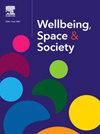Rural and regional community stakeholder perspectives on dementia, socio-spatial rights and community participation
IF 2.2
Q2 GEOGRAPHY
引用次数: 0
Abstract
Dementia-friendly communities (DFC) aim to address the socio-spatial exclusion of people living with dementia and carers. While the rights of people living with dementia and carers are often discussed in relation to DFCs, few are considered genuine rights based environments, and none specifically address socio-spatial rights. This has implications for planning policy and practice in terms of ensuring socio-spatial inclusion, social health and health equity. Drawing on Lefebvre’s (1996) ‘right to the city’ concept, this study aims to identify local government, healthcare organisation and community group perspectives on the rights of people living with dementia and carers to participation in decision-making, inclusion and access to public space and social activities. Semi-structured interviews were conducted with fifteen representatives of community stakeholder organisations and groups from a large non-metropolitan region in Victoria, Australia. Findings identify that socio-spatial rights are addressed through a personhood approach. The facilitation of socio-spatial rights is impeded by the absence of people living with dementia from participatory processes, as well as stigma, local government priorities, and the lack of dementia awareness, dementia-inclusive legislation and policy, and recognition of dementia as a disability. Dementia education and dementia-inclusive legislation and policies are critical to establishing genuine rights-based DFCs.
农村和区域社区利益攸关方对痴呆症、社会空间权利和社区参与的看法
痴呆症友好社区(DFC)旨在解决痴呆症患者和护理人员的社会空间排斥问题。虽然痴呆症患者和照护者的权利经常被与发展中国家联系起来讨论,但很少被认为是真正基于权利的环境,也没有一个具体涉及社会空间权利。这对确保社会空间包容、社会健康和卫生公平方面的规划政策和实践产生了影响。借鉴Lefebvre(1996)的“城市权利”概念,本研究旨在确定地方政府、医疗保健组织和社区团体对痴呆症患者和护理人员参与决策、融入和进入公共空间和社会活动的权利的看法。对来自澳大利亚维多利亚州一个大型非大都市地区的15名社区利益相关者组织和团体的代表进行了半结构化访谈。调查结果表明,社会空间权利是通过人格方法来解决的。痴呆症患者无法参与相关进程、耻辱感、地方政府的优先事项、缺乏对痴呆症的认识、包容痴呆症的立法和政策,以及对痴呆症作为一种残疾的认识,都阻碍了促进社会空间权利的实现。痴呆症教育和包容痴呆症的立法和政策对于建立真正基于权利的发展中国家至关重要。
本文章由计算机程序翻译,如有差异,请以英文原文为准。
求助全文
约1分钟内获得全文
求助全文
来源期刊

Wellbeing Space and Society
Social Sciences-Social Sciences (miscellaneous)
CiteScore
2.70
自引率
0.00%
发文量
46
审稿时长
124 days
 求助内容:
求助内容: 应助结果提醒方式:
应助结果提醒方式:


